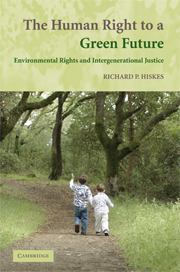Book contents
- Frontmatter
- Contents
- Acknowledgments
- Introduction
- 1 Environmental Human Rights and Intergenerational Justice
- 2 Emergent Human Rights, Identity, Harms, and Duties
- 3 Reflexive Reciprocity and Intergenerational Environmental Justice
- 4 Cosmopolitan Ethics, Communal Reciprocity, and Global Environmentalism
- 5 Toward a Global Consensus on Environmental Human Rights
- 6 Human Rights as Inheritance: Instituting Intergenerational Environmental Justice
- 7 Conclusion: Environmental Justice and the Emergent Future of Human Rights
- References
- Index
1 - Environmental Human Rights and Intergenerational Justice
Published online by Cambridge University Press: 01 July 2009
- Frontmatter
- Contents
- Acknowledgments
- Introduction
- 1 Environmental Human Rights and Intergenerational Justice
- 2 Emergent Human Rights, Identity, Harms, and Duties
- 3 Reflexive Reciprocity and Intergenerational Environmental Justice
- 4 Cosmopolitan Ethics, Communal Reciprocity, and Global Environmentalism
- 5 Toward a Global Consensus on Environmental Human Rights
- 6 Human Rights as Inheritance: Instituting Intergenerational Environmental Justice
- 7 Conclusion: Environmental Justice and the Emergent Future of Human Rights
- References
- Index
Summary
I can't help feeling that we are the most wretched ancestors that any future generation could have.
Yehudi MenuhinThe phenomena of global warming and climate change give rise to a singular question: what do the living owe those who come after them? For many thinkers this is a nonsensical query; for others it is simply unanswerable, yet politically it tantalizes in its persistence, especially among environmentalists. As we shall see, the entire cause of environmentalism presumes a connection with and a concern for the claims of future persons that ensure this question a defining place in environmental politics.
As a question invoking the language of justice, many philosophers follow the eighteenth-century philosopher David Hume in his disdain for even asking it, and liberal theorists of justice have been on the defensive ever since. Hume ridiculed social contractarians for believing that the circumstances of justice could be met in a relationship between a living generation and one that either no longer existed or did not yet exist. His logic, at first glance anyway, seems impeccable: it has always been difficult to envision real obligations owed to persons whose nonexistence makes their claims irrelevant in both law and logic. Nevertheless, the twenty-first-century concerns surrounding environmental degradation have revived the need for a convincing argument to protect future generations. This book seeks that argument within the muscular language of human rights, specifically the human rights that together constitute “environmental human rights.”
- Type
- Chapter
- Information
- The Human Right to a Green FutureEnvironmental Rights and Intergenerational Justice, pp. 5 - 25Publisher: Cambridge University PressPrint publication year: 2008



